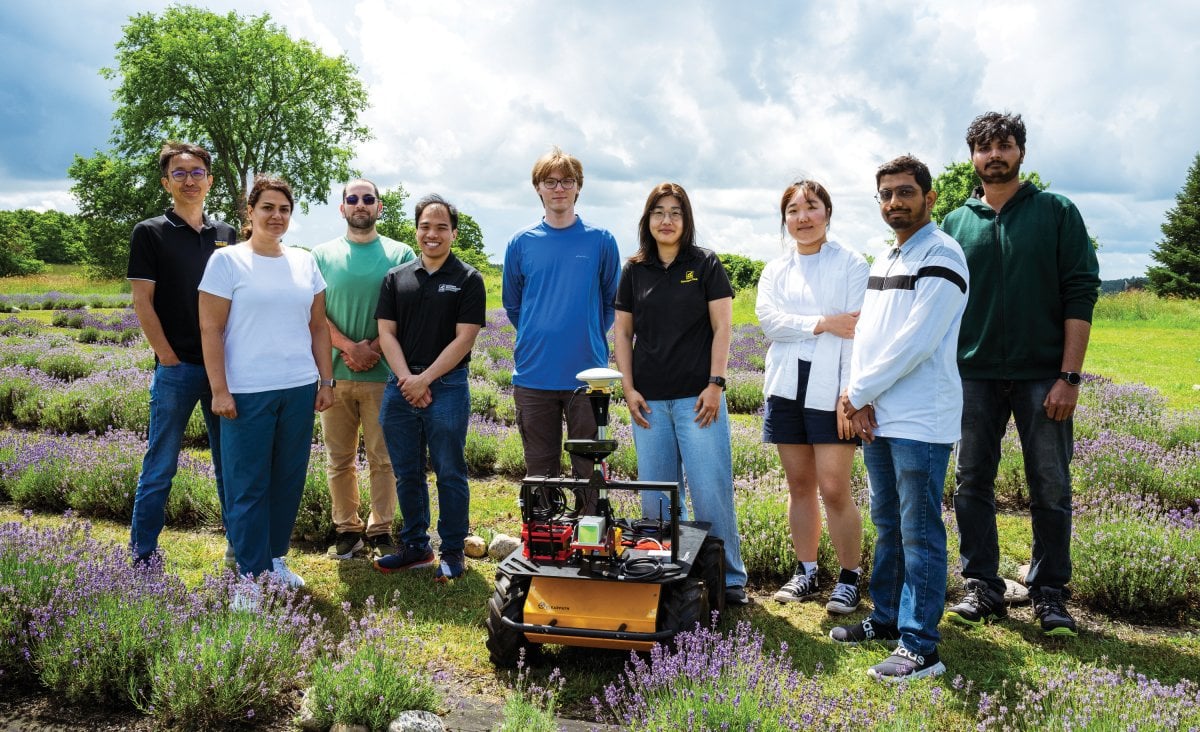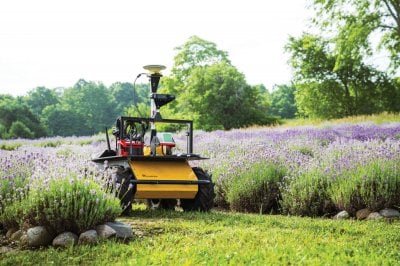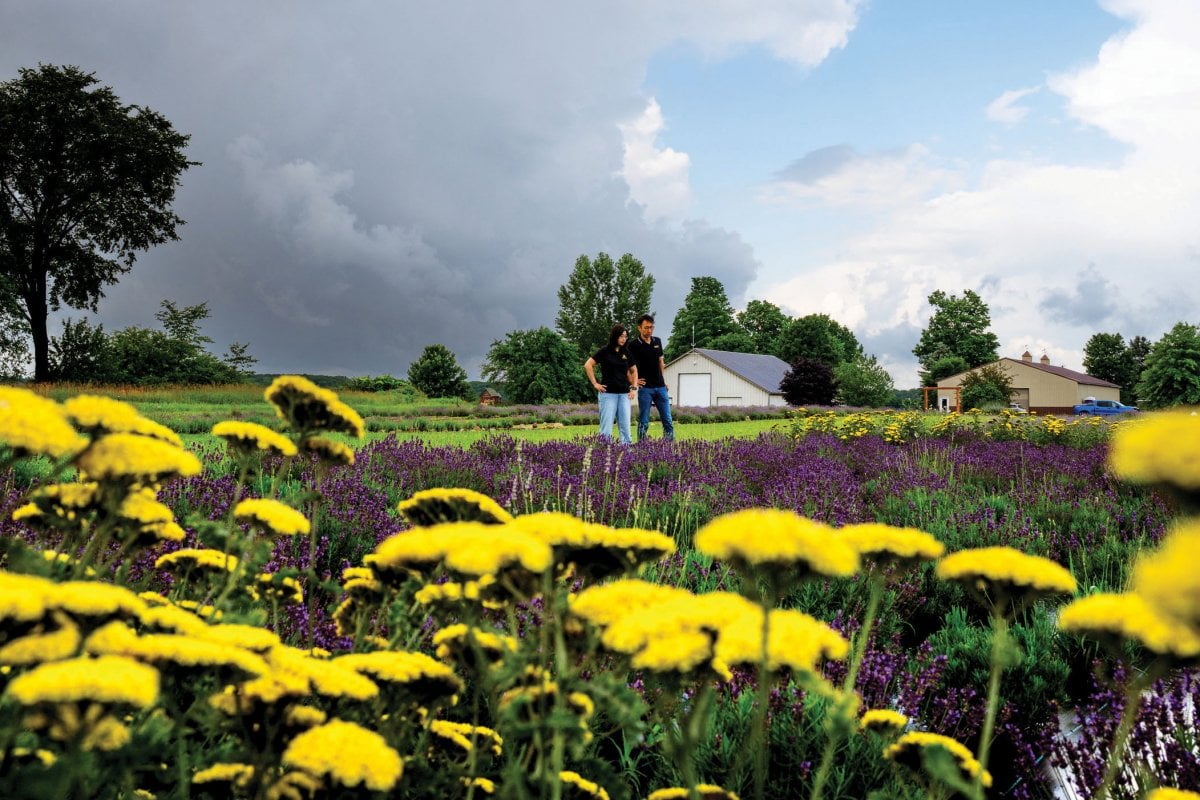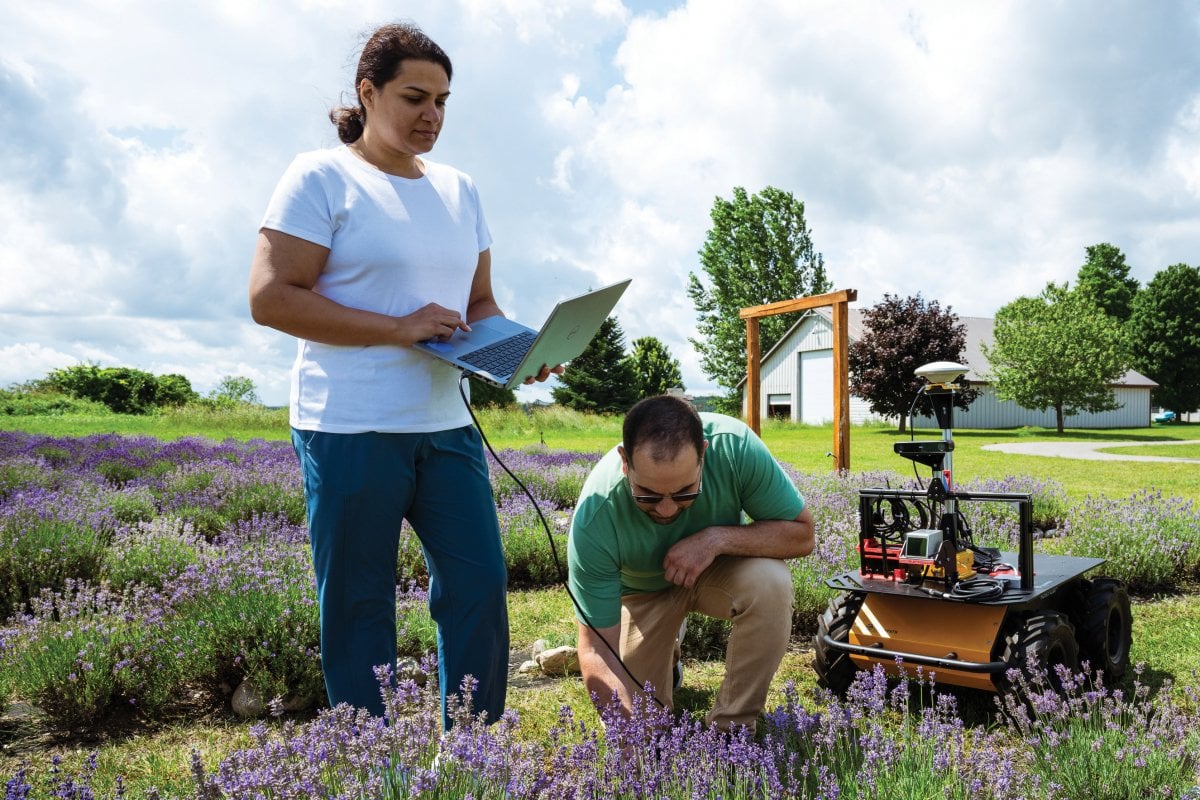Lavender fields may soon feature more than their eponymous color, signature fragrance, and blissed-out visitors—including humans and pollinators.
Picture a robot fleet that can carry out the harvest in a way that's more sustainable for both the farm economy and environment. That's the vision for the $423,000 project led by Assistant Professor Jung Yun Bae.
Bae and team members are working on the project with The Lucky Clover Farm in Gaylord, Michigan. The farm cultivates seven distinct lavender species, each with its own unique stem and flower morphology characteristics.
"Handling the diverse configurations of lavender species requires manual and laborious care," wrote farm owner Jeanne Mouch in her support for the grant application. "The project led by Michigan Tech is dedicated to revolutionizing small-scale lavender farming by integrating multiple mobile robots equipped with advanced manipulators."
Bae said that Mouch's life partner, Josh, took the lead in initiating the project, and has continued to support it in many ways.
Michigan Tech's proposed automated floriculture harvesting system is being developed to support small farms. In floriculture, where the final product is the flowers themselves, much of the process relies on manual labor to maintain product quality. The ongoing decline in workers in the agricultural labor force poses a significant obstacle. Bae's team aims to develop a robotic platform by integrating advanced technologies, including mechanical design, artificial intelligence, modern control algorithms, and autonomous navigation, to address the labor shortage and offer cost-effective solutions to farmers.
During their initial field trip, Michigan Tech researchers planned to focus on collecting sensor data from various lavenders in the field, while checking robot mobility on the farm. "Hopefully I will be able to take some photos of robots running in the field, although we don't have arms attached to the robot yet," Bae said.
The project, titled "Improving Climate Resiliency and Economic Return of Michigan's Labor-Intensive Produce Using Low-Cost, Modular Robotic Fleets," will take place over the next two years. It's part of $2.5 million in farm innovation grants awarded by the Michigan Department of Agriculture and Rural Development.
Team members include co-investigators Vinh Nguyen, assistant professor, and Myoungkuk Park, research assistant professor; Amanda Stump, project manager; and two graduate students.
"Vinh is developing a robotic arm for harvesting, Myoungkuk is handling autonomous navigation at the agent level, and I'm coordinating robots, assuring completion of the given missions while overseeing the project," said Bae. "Amanda will help us manage the project. We have two grad students who will be mainly involved in the project, with more students in supporting roles."
Government and industry leaders said the project holds promise for multiple applications that can help advance Michigan's agricultural and rural development. "My organization, the Manufacturing Growth Alliance, leads Michigan's Industry 4.0 Grant Initiative, with funding from the Michigan Economic Development Corporation. In our role, we have had the great pleasure of collaborating with Michigan Tech's Mechanical Engineering Department," wrote A. Elizabeth Bernhard in voicing the MGA's support for the project. "Moreover, we first learned about Lucky Clover Farm in August of 2022 and about their vision to revolutionize small-scale agriculture through the adoption of robotics and AI technology. We are extremely excited about this proposal and will continue to find ways to bolster it with our statewide organizational network, Industry 4.0 knowledge hub, and resources."
"Developing these groundbreaking algorithms represents a significant leap in small lavender farm automation, with the potential for broader applications in small fruit farm automation. This project not only promises to streamline lavender harvesting but also holds the key to transforming the future of small-scale agricultural automation in the Michigan farming landscape."
Marty Gerencer, executive director of the West Michigan Food Processing Association, said Bae's expertise in industrial automation and mobile robots provides a unique opportunity to find and share affordable solutions that serve the needs of small- to medium-sized agricultural businesses.
"This project not only promises to streamline lavender harvesting but also holds the key to transforming the future of small-scale agricultural automation in the Michigan farming landscape," said Gerencer.
Following field data collection, researchers turned to developing and training a lavender detection system. Next comes design and development of a robotic manipulator harvesting system, followed by mechanical and software integration of the technologies onto a fabricated robotic arm. "Once the design and fabrication stages are completed, we will program the end-effector tooling to emulate a farmer's task in harvesting. The lavender detection system will classify and pinpoint the lavender for grasping, and the end-effector system will then securely grasp and fixture the lavender," Bae explained. "Subsequently, the mobile manipulator will shear the lavender plant while held in the grasp, and the harvested lavender will be loaded onto the basket mounted on the mobile platform."

Specific performance targets include five minutes per plant for harvesting and eight hours of continuous automated harvesting operations without any human intervention, said Bae. "We'll conduct comprehensive field tests at Lucky Clover Farm in two distinct areas: one with densely configured lavenders, 18 inches apart, and another with more spread-out lavenders, six feet apart."
After successful pilot testing, the Michigan Tech team plans to work with the Michigan Manufacturing Growth Alliance to help reduce barriers to adoption by farmers through the Michigan Economic Development Corporation Industry 4.0 Grant program.
The project outcomes, which include software and hardware, will be shared with the public through open-source platforms to further lower barriers to automation integration. By showcasing the project to Michigan farmers, researchers aim to show these small businesses the possibilities.
Michigan Technological University is an R1 public research university founded in 1885 in Houghton, and is home to nearly 7,500 students from more than 60 countries around the world. Consistently ranked among the best universities in the country for return on investment, Michigan's flagship technological university offers more than 185 undergraduate and graduate degree programs in science and technology, engineering, computing, forestry, business, health professions, humanities, mathematics, social sciences, and the arts. The rural campus is situated just miles from Lake Superior in Michigan's Upper Peninsula, offering year-round opportunities for outdoor adventure.







